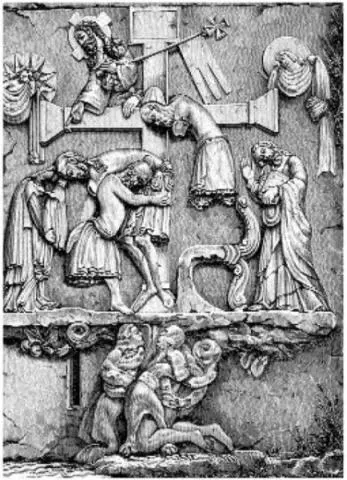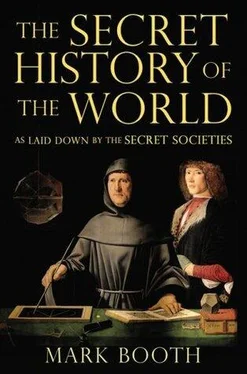The fiercely independent Celts would continue to insist on the primacy of direct, personal experience of the spirit worlds, and would develop esoteric traditions independent of Rome. Some of the beliefs and practices of these and other early Christians would come to be dubbed heretical by the Roman Church.
When people care deeply about the same things, when they share what the existentialist theologian Paul Tillich called ‘ultimate concerns’, they are sometimes incredibly sensitive to different shades of opinion. Differences of opinion may lead to murderous hatred, so that my greatest enemy is not the alien conqueror coming over the horizon with bloody tears carved into his cheeks but a brother or sister I rub shoulders with in the congregation.
Sometimes, too, members of a congregation will try to ban beliefs — as had the Emperor Augustus — not because they believe them to be false, but because they believe them to be true.
THE HISTORY OF THE FOUNDING OF THE Roman Church and its dissemination through the good offices of the dying Roman Empire has been written both by the Church and by its enemies. The Emperor Constantine claimed that in the middle of the night, before he went into battle against rebels, he had a dream in which Jesus Christ appeared to him and told him to put the sign of the cross on his battle flag, with the inscription ‘In this sign thou shalt conquer’. Constantine obeyed and the rebels were duly defeated.
He declared Christianity the official religion of the Empire, donating the Lateran Palace to the Bishops of Rome. There were undoubted political benefits to this. The new form of consciousness that had been initiated in Jerusalem was spreading with great vigour through the Empire, and Constantine capitalized on this by offering freedom to any slave who converted and twenty pieces of gold to any who were already free.
As we have seen, the Romans made a cult of cruelty. The imposition of power by one man on another, taken to its furthest extremes, was exalted. The Romans were ruthless and ruthlessness was a manly virtue. So the Christian exaltation of meekness and humility turned everything upside down and inside out. The Christians clearly knew of new joys and satisfactions, new ways of being in the world.
Consider how strange meeting a Christian initiate must have seemed to a Roman. Here was a new form of consciousness. Here were people able to live inside their heads. They were lit up inside by an enthusiasm and a certainty about spiritual experience. It must have been as baffling and intriguing as it was, hundreds of years later, for a pygmy in Papua New Guinea to meet for the first time a European explorer. There were whole new worlds behind those eyes.
CONSTANTINE MAY HAVE HOPED THE RIGOROUS new religion would help slow down the decline of the Roman Empire, but he remained anxious about a prophecy in the Sibylline Oracles that Rome would again become the haunt of wolves and foxes.

Exsternsteine in Germany. This ancient carving is a few paces away from an older carving of a Norse god hung on a tree, in a happy acceptance of the fact that Christianity grew out of pagan traditions. Note that esoteric understanding of the different bodies of the individual is alluded to in the fact that while the material body of Jesus Christ is being taken down from the cross, his spirit already rests in the arms of his Father.
He decided to try to thwart this prophecy by transferring the spirit of Rome to another location and founding an alternative capital. So from under a porphyry pillar he dug up the Palladium, the ancient god-carved statue that, as we saw, had been carried from Troy for the founding of Rome. Then he reburied it at the site of the city that would be called Constantinople. It was buried under the same pillar but now topped by a statue of the Sun god, crowned with the nails from the true cross in the form of a sort of nimbus.
This symbolism, incorporating initiatic teaching regarding the Sun god, would have been understood by initiates of all religions, so it is perhaps slightly ironic that under the aegis of Constantine, the Church began to suppress initiatic teachings and to reduce its exoteric teachings to dogma. In 325 the Council of Nicea decided which gospels among the many in circulation were the real thing. Imperial edicts also forbad pagan practices. On the orders of Constantine’s sons, women and children were force-fed, their mouths held open by a wooden engine while consecrated bread was stuffed down their throats.
When Constantine’s nephew Julian came to power in 361, he reversed the tide of religious intolerance. Having been brought up a pupil of the Neoplatonist philosopher Iamblichus, he well understood the mission of the being he called the ‘Seven-rayed god’. He gave equal rights to all subjects regardless of their religious beliefs and gave permission for pagan temples to reopen.
Julian wrote a famous polemic against the narrow, dogmatic Christianity that had grown up during the time of Constantine, which is why later Christian writers came to call him the Apostate, meaning someone who discarded the faith. He believed that Christianity had been seeking to deny the reality of the gods he had encountered through initiation.
Julian led a military campaign into Persia. Just as the Greeks had besieged Troy to control the initiation knowledge hidden within, Julian wished to understand the secret knowledge of the Manichaean Mystery school based in Persia. He knew enough to know that the mission of the Sun god was under threat, and that the inner mysteries of Manichaeism concerned the secrets of the war between the Sun god and Ahriman — or Satan — the spirit of materialism.
But before he could accomplish his mission, Julian was murdered by a follower of Constantine, and a new Saturnine era began, when knowledge of true, initiatic spirituality would finally be driven underground. The Emperor Theodosius began a ruthless policy of suppressing all disagreement with the imperial line on Christian doctrine. He confiscated the property of ‘heretics’ and took over their temples. Statues of Isis were rededicated to Mary. The Pantheon in Rome has a sublime and cosmic beauty unlike any purpose-built church. This temple to all the gods was converted by Theodosius into a temple of monotheism.
Theodosius closed down the Mystery schools and in 391 besieged the Serapeum in Alexandria. This sacred compound with a vast cloud-capped temple to Serapis was one of the wonders of the ancient world. Inside a statue of the god was suspended from the ceiling by a magnet. There were also libraries that housed the world’s greatest collection of books. Fortunately many books were smuggled out before the Serapeum was burned to the ground and its sacred statues dragged through the streets.
Finally Theodosius turned his attention to the Neoplatonic school of philosophy based in Alexandria, foremost preserver of the intellectual legacy of the Mystery schools. The great personality of Neoplatonism at that time was a young woman called Hypatia. Daughter of a leading philosopher and mathematician, she was educated in philosophy, maths, geometry and astronomy. Her father had also developed a series of exercises to make her body a fitting vessel for a brilliant mind. She loved swimming, horse riding and mountain climbing. So she was beautiful as well as clever, and she soon won fame as an inventor of scientific instruments, including one to measure the specific gravity of liquids. Only a few fragments of her writing have survived, but she was known far and wide as one of the most brilliant minds of the time.
She attracted large crowds as a lecturer. Well versed in the wisdom of Plotinus and Iamblichus she explained in her lectures how Christianity had evolved out of the teachings of the Mystery schools, and she argued, like her father, that no single tradition or doctrine could have exclusive claim to the truth.
Читать дальше













